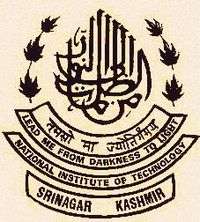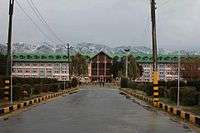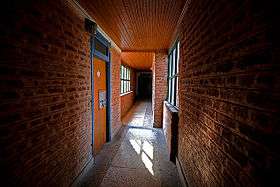National Institute of Technology, Srinagar
 | |
| Motto | तमसो मा ज्योतिर्गमय اندھیروں سے روشنی میری راہنمائی |
|---|---|
Motto in English | Lead me from Darkness to Light |
| Type | Public (Institute of National Importance) |
| Established | 1960 |
| Director | Prof. (Dr).A.R Dar |
Academic staff | 400 |
| Undergraduates | 2200 |
| Postgraduates | 300 |
| 125 | |
| Location |
Srinagar, Jammu & Kashmir, J&K 34°7′30″N 74°50′23″E / 34.12500°N 74.83972°ECoordinates: 34°7′30″N 74°50′23″E / 34.12500°N 74.83972°E |
| Campus | Urban, near world heritage site Dal Lake in the heart of Srinagar city |
| Acronym | NITSRI |
| Website |
nitsri |

National Institute of Technology, Srinagar (NITSRI) (Hindi: राष्ट्रीय प्रौद्योगिकी संस्थान, श्रीनगर) (Urdu: ٹیکنالوجی سرینگر کے قومی ادارے) is a technical (Engineering) institute, located in Hazratbal, Srinagar, Jammu and Kashmir, India and a leading technological institute of India,[1] along with other NITs and IITs. It is one of the 31 NITs in India, and as such is directly under the control of the Ministry of Human Resource Development (MHRD). It is the 7th in the chain of 17 NITs established as a part of the Second Five Year Plan (1956–61) by the Government of India.[2] Refer History of RECs for more information on the Regional Engineering College established during the 2nd five-year plan (1956–60). The institute has recognition as an Institute of National Importance under NIT act of Parliament and has produced more than 8000 graduates.[3]
History
NITSRI was established in 1960 as the Regional Engineering College, Srinagar. It was one of the first eight Regional Engineering Colleges established by Government of India during the first Five Year Plan.[4] The institute shifted to its present campus in 1965. As the Regional Engineering College, the college was affiliated with the University of Kashmir.The Regional Engineering College, Srinagar was upgraded to become the National Institute of Technology, Srinagar in July, 2003.[5] In the same year, the institution was granted Deemed University status with the approval of the University Grants Commission, All India Council of Technical Education and the Government of India. On 15 August 2007 it became an Institute of National Importance under the NIT Bill passed by the parliament of India.[6][7] Now NITSRI is an autonomous body that conducts its own academics along with the other NITs and IITs of India.
Location
The institute is located on the western bank of the world heritage site, Dal Lake near the Hazratbal Shrine in the north eastern region of the Srinagar city. It has a campus of about 100 acres[8][9] The campus of NITSRI is recognized as one of the most beautiful college campuses in India by IBN Live.
Admissions
The admissions to undergraduate and postgraduate programmes of NITSRI is done through the following ways:
Undergraduate Course (B.Tech)
- Joint Entrance Examination (JEE-Main), formerly All India Engineering Entrance Examination (AIEEE)
- DASA (through SAT, for non-resident Indians)[10]
Postgraduate course
- Graduate Aptitude Test in Engineering (GATE) (Through CCMT counselling for admission to M.Tech courses)
- Joint Admission Test for M.Sc. (JAM) (For M.Sc. Courses)
Academics
Rankings
| University and college rankings | |
|---|---|
| Engineering – India | |
| NIRF[11][12] | 67 (2016) |
| Outlook India[13] | 61 (2012), 57 (2013) [14] |
| Business – India | |
NITSRI was ranked 57th among various engineering colleges of India by the survey of Outlook India in 2013. It was awarded the outstanding engineering institute in the northern region of India, by Dainik Bhaskar in 2013 and by ABP News in 2014. In April 2016, it was ranked 67th in National Institutional Ranking Framework published by Ministry of Human Resource Development in April 2016.
Departments
- Bachelor of Technology (B.Tech)
- Chemical Engineering
- Civil Engineering
- Computer Science and Engineering
- Electrical Engineering
- Electronics and Communication Engineering
- Information Technology
- Mechanical Engineering
- Metallurgical & Materials Engineering (Formerly Metallurgical Engineering)
- Master of Technology (M.Tech)
- Structural Engineering
- Water Resources Engineering
- Geotechnical Engineering
- Transportation Engineering
- Communication and Information Technology
- Microelectronics.
- Electrical Power and Energy System
- Industrial Tribology and Maintenance Management
- Mechanical System Design
- Chemical Engineering
- Arts and Science
Department of Chemical Engineering
The Department of Chemical Engineering was started in 1963 with a five-year degree programme (BE) in Chemical Engineering. Later it was converted to a four-year degree programme and the first batch under this programme passed out in 1985. With the conversion of REC Srinagar to NIT Srinagar in 2003, the B.E. courses were merged into B.Tech. courses. The Department presently offers instructions at undergraduate level leading to 4 year B.Tech. degree in Chemical Engineering. The Department has produced more than 2000 chemical engineering graduates majority of them have been from different parts of the Country. Few of them were also from foreign countries like Iran, Libya, Jordan, Palestine, Saudi Arabia and Sudan. The Department has been maintaining close liaisons with Indian Institute of Technology Delhi, J&K Science and Technology Department, State Pollution Control Board, Regional Research Laboratory, Jammu and various industries in J&K State. The department has started masters course (M. Tech) in late summer 2015 under the guidance of current Head of the Department, and Ex-HOD Dr Noor Salam Khan. The major courses offered by the department include Chemical Reaction Engineering, Mass Transfer Operations, Chemical Engineering Thermodynamics, Transport Phenomena, and Chemical Technology. Most of the permanent staff of the department are natives who earned their bachelor's degrees from the same institute.
Department of Civil Engineering
The department of Civil Engineering is the largest and one of the earliest Engineering departments of NITSRI, established in the year 1960. The department offers instructions at undergraduate level leading to 4-year B.Tech degree in Civil Engineering and at the post graduate level leading to M.Tech degrees in Water Resources Engg. and Structural Engg., and also Ph.D. degrees. The instruction at the undergraduate level aims at providing the students a broad based education with emphasis on theory and practice of Civil Engineering, keeping in view the current and future requirements of the industry. At the post graduate level, students are trained to assume independent responsibilities laying emphasis, again on country’s current and future requirements in the industry, R&D Organisations, design firms and academic institutions. Field visits are arranged for students at all levels to acquaint them with practical knowledge in the various areas of Civil Engineering. The department is equipped to carry out research leading to M.Tech and Ph.D. degrees. The department also takes Consultancy Assignments from industry in the areas of Geo-technical Engineering, Transportation Engineering, Structural Engineering, Water Resources Engineering, and Surveying.
Department of Computer Science and Engineering
The Department of Computer Science and Engineering was started in the year 2007, offering four year undergraduate courses, wherein undergraduate students are imparted knowledge in multitude of specialties, including: computer architecture, networks, operating systems, data structure and algorithms, theory of computation, numerical analysis, compiler design, graphics, artificial intelligence, database management system, data mining, software engineering, and human-computer interaction. In addition to academic work, the CSE department also has computer science research programmes (for a full listing of specialties visit Research Areas) supported through government and industry funding. Faculty research helps define and expand the current and future use of technology.
Department of Electrical Engineering
The Department of Electrical Engineering was one of the first departments of NITSRI. It was established in 1960 with Dr. Russell. W. Burns as its first Head of the Department. Lying in the heart of the institute, this department has an experienced faculty. There are ten laboratories in the department, including a computer lab and the electrical workshop. The department has a sanctioned intake of 78 students at B.Tech level. The students are admitted on the basis of entrance test conducted at the National level JEE Main (Formerly AIEEE up to 2012). A number of students are absorbed by various organizations and campus placement under Campus Recruitment Program (CRP).Professor Shamim Ahmad Lone is the present Head of the Department.
Department of Electronics and Communication Engineering
The department was established in 1984,the Department of Electronics and Communication Engineering has developed a vast infrastructure and a competent faculty. The faculty specializations include: VLSI design, communications, image processing, micro-electronics, machine vision,Microcontrollers and data security. The Department is an ISTE-approved centre for offering computer science courses.The Department offers consultancy and research in many areas. The students are admitted for graduation courses on the basis of entrance test conducted at the national level i.e. JEE Main (formerly AIEEE). The Department is also running a PG course in Communication & IT, which has an intake of 18 students per year. Future plans of expansion include R&D in tele-medicine, and development of VLSI Design Center.
Department of Information Technology(IT)
The Department of Information Technology was established in 2007, offering four year undergraduate programme (B.Tech.) in Information Technology. This undergraduate programme is of 4 years duration with the first year spread over two semesters which is common to all the branches. The intake capacity of the department was 40 in 2007 and then subsequently increased to 55 in 2009. The Department offers a broad curriculum including: database management, software engineering, management of information systems, data mining, computer graphics, advanced internet technology, computer networks, operating systems, data structures and algorithms as the main courses and other courses in collaboration with the other departments of the institute at the undergraduate level. In addition to academic courses, the department also has IT research programmes supported through government funding and industry sponsorship. Faculty research helps expand the current and future use of new and existing technologies.
Department of Mechanical Engineering
The department was established in 1960, the Department of Mechanical engineering has an intake capacity of 77 in B.Tech and 25 in M.Tech (Mechanical System Design). Prof. G. A. Harmain[15] is the present Head of the Department. The students are admitted to B.Tech. on the basis of entrance test conducted at the national level JEE Main. The curriculum includes a diverse range of the subjects. The department has 12 labs to cater to the needs of the students. The Department has established a M.Tech course in Mechanical System Design which is running from the last six years. The department is recognized as Royal Mechanical Engineering Department, as it is the oldest department of NIT Srinagar.
Department of Metallurgical & Materials Engineering
The department of Metallurgical & Materials Engineering (earlier known as the Department of Metallurgical Engineering) was established in the year 1963 and is designated as an oldest department of NITSRI. It conducts a four-year under-graduate academic programme leading to the award of B.Tech. Degree in Metallurgical & Materials Engineering. At present, the sanctioned intake strength of students at B.Tech level is 60 per year. Students are admitted for the undergraduate programme (B.Tech) through the national test AIEEE (Now JEE Main). The Metallurgical & Materials Engineering Professional Education starts at the second year (3rd Semester) level of the B.Tech. programme. The engineering programme is based on the credit system and the student evaluation is done on the performance of the student in three written examinations being conducted in each subject/course during the semester at a definite interval of the time period. Based on the performance in the examinations and in the class, the students are awarded grades on absolute basis.The curriculum of B.Tech programme includes compulsory industrial training of 4–6 weeks duration after 5th Semester in the relevant industries/R & D centres in and or outside the states. A two Semester "Project Work" is given to the students to synthesize their knowledge in relevant areas of engineering.The department has adequate laboratory facilities to conduct experiments for the undergraduate students in various courses of the engineering curriculum. The department includes disciplines VIZ. Foundry Tech., Materials Technology, Corrosion Engineering, Welding Technology, Physical Met., Ferrous and Non-ferrous Metallurgy, Non-destructive Testing and Evaluation. Apart from teaching, the department is engaged in a wide range of activities covering research and development, testing and consultancy, curricular and faculty development. The work of the faculties and the students of this department includes Indian Institute of Metals - Students Affiliated Chapter, NIT Srinagar, that was founded in 2013. This was the first innovative work done in the field of Metallurgy, in the valley, by the pupils of NITSRI.
Student life
Facilities of NITSRI includes a Central Library and a Computer Services Center with internet access, as well as the departmental Computer Centers, 24x7 WiFi service at Indus hostel, Chenab, Dal Hostel, Tawi Hostel and LAN at Jhelum hostel only and a shopping unit.The Institute provides boarding facilities to all the students and the faculty members, on the campus. The students also have the option of staying outside the campus and study as day-scholars. The Institute provides separate hostels for the male and female students with separate mess facilities. There are also guest houses available to meet additional temporary housing needs.
- Halls of residence

- Indus Boys Hostel (for 1st year B.Tech students)
- Chenab Boys Hostel (for 2nd year B.Tech students)
- Tawi Boys Hostel (for 3rd year B.Tech students)
- Jehlum Boys Hostel (for 4th year B.Tech students)
- 8-Block Dal Boys' Hostel (For 4th and 3rd year B.Tech Students)
- Jhelum Extension Boys' Hostel (For 3rd and 2nd year B.Tech students)
- Hostel for Postgraduate and PhD students (C Block, Tawi)
- Girls' Hostel (Combined for B.Tech, M.Tech and PhD girl students) (All Years)
The Institute was planning to build a Mega Hostel of 1000 students capacity but was unable to do so because of ban on constructions near dal lake by J&KLAWDA (J&K Lakes and Water Development Authority). There is a Common-hall, adjacent to the hostels, which provides facilities for indoor games like table-tennis and carrom, along with a fully equipped gymnasium. The Institute has a Maintenance Engineering Centre set up under the Indo-Italian collaboration. The centre caters to the maintenance engineering needs of the Institute and as the region as a whole in respect of research, consultancy and academics.
Technical festival

Techvaganza is a national-level technical festival of National Institute of Technology Srinagar, Jammu & Kashmir, India. Techvaganza is a techno-management festival and is one of the largest festivals in India. The festival is organized annually in April.
Events at the festival include Blind Alley, Sniperbot, Smack Down, The Arduous, Maglev, Storm Warriors, Transform It, Dirt, Mad 4 Cad, CE Brains, Town Planning, Brick Wall Erection, Structurite, Shot Circuit, Digitronics, FPGA, Fulcrum, Circuit Bizz, Vikings, MATLAB Forum, Botorace, IDP, algobat, De’ C-Coding, Go Fix it, Animation, Spot Event, Techtonic Quiz, Metallomania, and P3.
Notable alumni
- Subhash Kak - Regents Professor and a previous Head of Computer Science Department at Oklahoma State University, Stillwater
- Dawood Danesh Jafari - Ex-Minister of Finance & Economic Affairs, Iran
- Vijay Vaishnavi - Professor Emeritus and a former Board of Advisors Professor (Department of Computer Information Systems) and Professor (Department of Computer Science) at Georgia State University
- Sonam Wangchuk -He is the Founding Director of the Students’ Educational and Cultural Movement of Ladakh (SECMOL) which was founded in 1988.
External link
References
- ↑ "ConnectNIT".
- ↑ "About us". NIT Jamshedpur. Retrieved 12 June 2013.
- ↑ "The Daily Etalaat".
- ↑ National Institutes of Technology
- ↑ "The Hindu". Chennai, India. 17 August 2003.
- ↑ "Three Bills passed in 15 minutes", "The Hindu", 15 May 2007.
- ↑ National Institute of Technology Act 2006
- ↑ "NIT Srinagar".
- ↑ "REC (NIT)Srinagar Alumni".
- ↑ http://www.dasanit.org/
- ↑ "National Institutional Ranking Framework 2016". Ministry of Human Resource Development. 2016.
- ↑ "HRD Ministry announces universities ranking, IIT Madras and IIM Bangalore top the list".
- ↑ "Top Engineering Colleges". Outlook India. 16 June 2012. Retrieved 17 June 2012.
- ↑ Top Engineering Colleges 2013 by Outlook India.
- ↑ http://www.nitsri.net/mechanical/index.htm